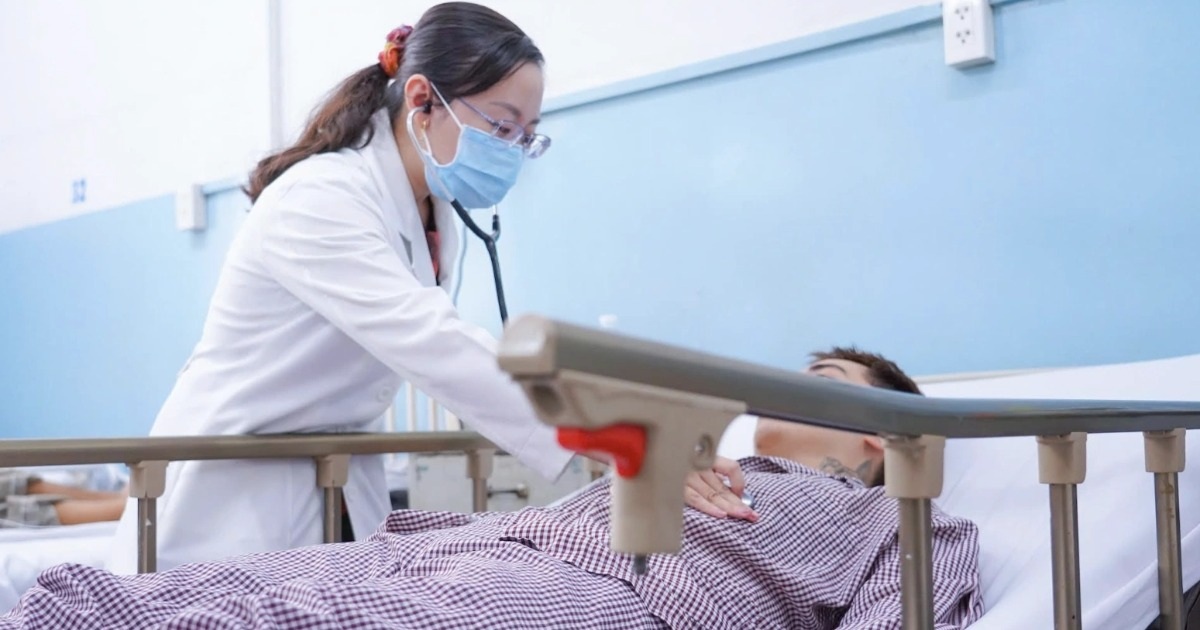14 Hospitals Record Over 270 Victims
On the afternoon of November 10, the Ho Chi Minh City Department of Health continued to report updated information on suspected food poisoning cases after eating banh mi from “Co B” shop in recent days.
According to the report, the banh mi shop mentioned above has two branches. Most of the patients ate banh mi from Branch 1 on Nguyen Thai Son Street (Hanh Thong Ward), while a few cases were from Branch 2 on Le Quang Dinh Street (Binh Loi Trung Ward).
Based on reports from the Medical Professional Department (Ho Chi Minh City Department of Health) and observations by Dan Tri reporters at hospitals, more than 270 patients related to the incident have been admitted to a total of 14 hospitals, including:
Military Hospital 175 (over 175 cases); Tam Anh General Hospital (26 cases); Nhan Dan Gia Dinh Hospital (52 cases, including 1 case positive for Salmonella blood culture, 1 severe case); Becamex International Hospital (9 cases); Trung My Tay General Hospital (7 cases); Children’s Hospital 2 (2 cases).
A patient related to the incident being treated at Nhan Dan Gia Dinh Hospital (Photo: Hospital).
University Medical Center Ho Chi Minh City, Campus 1 (Cho Lon Ward) admitted 2 cases, then transferred them to Thong Nhat Hospital and Trung My Tay Hospital for treatment.
Additionally, Binh Dan Hospital, My Duc Tan Binh Hospital, Hoc Mon Regional General Hospital, Khanh Hoi General Hospital, University Medical Center Ho Chi Minh City Campus 3, and Nhan Dan 115 Hospital also reported admitting patients suspected of food poisoning after eating banh mi.
Currently, the Medical Professional Department (Ho Chi Minh City Department of Health) has advised on a written report to the Ho Chi Minh City People’s Committee, the Ministry of Health, and a directive to hospitals to ensure proper admission, classification, and treatment according to the issued food poisoning treatment protocols.
Hospitals are also required to continue submitting quick reports to the Department of Health.
After treatment, a female patient’s health has stabilized (Photo: Hospital).
In an exchange with Dan Tri reporters, a leader from the Ho Chi Minh City Food Safety Department stated that since Salmonella bacteria have only been found in one patient, it is not yet possible to conclude that this is the cause of the mass food poisoning. Functional agencies are currently urgently investigating and handling the incident.
Recommendations from Doctors
Given the situation of admitting numerous patients suspected of food poisoning, Dr. Vo Hong Minh Cong, Deputy Director of Nhan Dan Gia Dinh Hospital, advised people to cook food thoroughly, drink boiled water, avoid eating raw or expired food; and separate raw and cooked foods.
People also need to cover food tightly; reheat leftover food above 70 degrees Celsius before eating; store food in the refrigerator, not at room temperature for more than 2 hours; wash hands with soap before preparing food, before eating, and after using the restroom; keep the kitchen and cooking utensils clean.
“People should only use food with clear origins and proper storage. Establishments selling pre-processed food must ensure food safety and hygiene, store food chilled below 5 degrees Celsius; sellers need to be trained in hygiene and safety, wash and disinfect hands before preparing food and before eating.
Especially, if food has a strange smell, stop using it immediately,” said Dr. Cong.
Doctors warn that food poisoning can lead to severe complications, even death if not treated early (Photo: Hospital).
Dr. Huynh Van Muoi Mot, Deputy Head of the Emergency Department at another hospital treating many cases, noted that when symptoms of poisoning such as vomiting, diarrhea, abdominal pain, or fever appear after eating, people should immediately stop consuming the suspicious food and promptly rehydrate with oresol solution or cooled boiled water.
Do not self-medicate with anti-diarrhea drugs or antibiotics, as this can prolong the retention of toxins in the intestines. If the condition is severe or there are signs of dehydration (dry lips, reduced urination, weakness, fatigue), patients need to go to a medical facility immediately for timely treatment.
“Food poisoning can cause severe dehydration, electrolyte imbalance, sepsis, or liver and kidney damage, even death if not treated early.
Self-treatment at home or delaying medical attention is a dangerous mistake that has led many cases to exhaustion or severe complications before hospitalization,” warned Dr. Muoi Mot.



